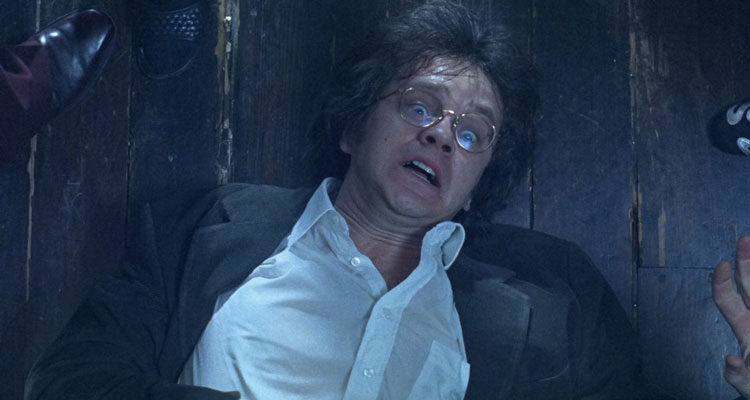The first time I watched Jacob’s Ladder, a psychological horror movie that feels like a drama, I was too young to understand it. I still have trouble grasping certain elements of it but does not take away anything from its quality. Coming to us from famous director Adrian Lyne (Lolita, Fatal Attraction, Nine 1/2 Weeks, Flashdance) this movie tackles a more serious theme than his previous projects. It’s visually striking and feels like a living nightmare anchored by Tim Robbins’ stellar performance.
Jacob’s Ladder is actually a term taken from the bible, where patriarch Jacob dreams about a ladder between Earth and Heaven and the backup title for the movie was Dante’s Inferno. Another interesting influence is the Tibetan Book of Dead: Bardo Thodol, explaining one’s journey into the next life (incarnation). The writer Bruce Joel Rubin actually spent two years in a Tibetan Buddhist monastery in Nepal. If you want to know more about the background of this movie, I recommend starting at this Wiki page but only after you’ve seen the movie.
The atmosphere is ominous and full of mystery. The same can be said about the story that seems a bit confusing at first. However, if you pay close attention to some of the dialogue you will get what they were trying to say. Especially Louie, his chiropractor, masterfully played by Danny Aiello. Do not be afraid of its complexity and ambiguousness, Jacob’s Ladder is a movie that works just fine even if you don’t get all the things you’re supposed to.
Jacob Singer is traumatized Vietnam veteran with little left to hold on to in his present life. His wife left him and his job is thoroughly unfulfilling. He soon starts seeing strange creatures, tentacles, and all kinds of other shit. Unable to distinguish reality from dreams or hallucinations, Jacob is able to find some sense of it all when he meets his old friend Paul. From there, things start to get more and more complicated.
Jacob’s Ladder bends reality with ease without coming off as contrived or pretentious. It successfully shows us what true paranoia looks and feels like. And just how dehumanizing “ordinary life” can be. You can say that Jacob’s Ladder is a movie about PTSD but it’s also something much more than that. It’s above all subversive, making you see things from a different perspective. And you can take this concept and use it in your own life. It does get a bit uncomfortable from time to time but so does life.

I want to add that Jacob’s Ladder is also a highly influential movie. For example, it served as an inspiration for the horror video game franchise Silent Hill. And please do not watch the 2019 remake as it’s really bad. I had to revisit this review just to add this as I had to say something about it. It’s a much better option to revisit the original, especially if there have been a few years since you last time you saw it. You’re a different person now and it will hit you differently.
Finally, I also think that Jacob’s Ladder is a cathartic experience. You sort of overload on depression, anxiety, and fear, just like Jacob in the movie. And just like him, you will experience a slow descent into hell only yours will kind of end once the movie is over. Or is it only then that it actually starts?

Director: Adrian Lyne
Writer: Bruce Joel Rubin
Cast: Tim Robbins, Danny Aiello, Jason Alexander, Elizabeth Peña, Matt Craven
Fun Stuff: Director Adrian Lyne used the art of painters William Blake, H.R. Giger, and Francis Bacon and photographers Diane Arbus and Joel-Peter Witkin as his primary influences for the visual style of the film.
Rating:
IMDb Link: http://www.imdb.com/title/tt0099871/



